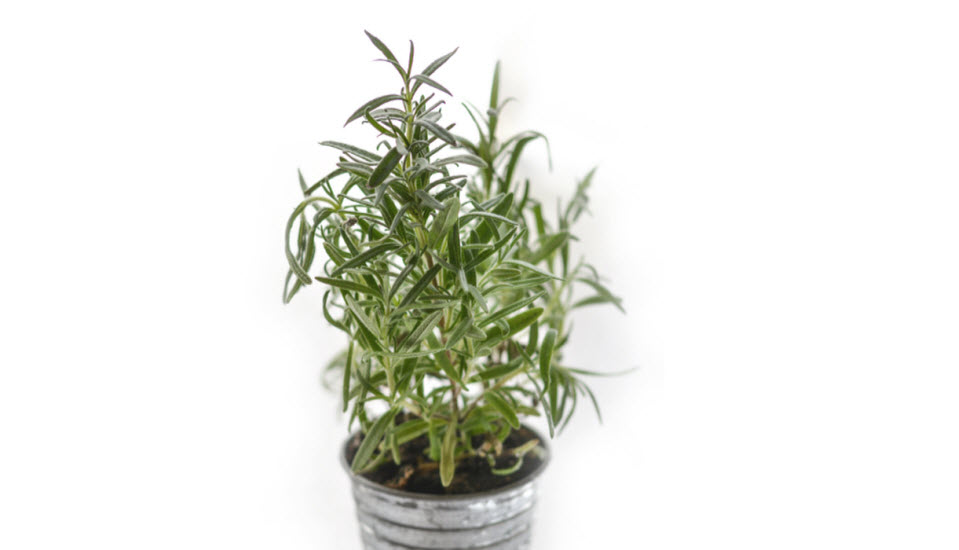The herb Rosemary has been a symbol of remembrance for ions. In herbal folklore, “Rosemary is for Remembering”. It was often used at times of funerals, anniversaries and when soldiers marched off to war. Its aroma has always been uplifting and stimulating; sharp, herbaceous and slightly camphorous are some adjectives used to describe its aroma. The penetrating aroma sharpens the senses and can focus the mind. By stimulating the mind, one has greater recall and greater ability to remember things. Because of its stimulating effects upon the nerves, brain and muscles, there is no time to sleep when Rosemary is around, as it also calls one to action! It is also renowned for its stimulating effects on the scalp and hair growth. Good for memory, exhaustion, pain, infection, digestion, stamina, hair growth and other things, its health and healing properties are legendary.
The ancient Romans and Greeks believed that Rosemary brought good luck and protected people from evil spirits. They believed that infections were brought on by evil spirits, so it is not surprising that they came to believe that Rosemary could protect them, which could also be called good luck! We know now that one of Rosemary’s therapeutic qualities is that of being an antiseptic.
Here is what Banckes’ Herbal had to say about Rosemary back in 1525: “If thou be feeble boyle the leaves in cleane water and washe thyself and thou shall be shiny … smell it oft and it shall keep thee youngly.”
In spiritual work, Rosemary is said to cleanse “energetic muck”; its sharp aroma penetrates and clears the auric field. Perhaps this is partly due to the fact that the aroma causes some people to release their pent-up anger. Anger is often one of the root causes of long-standing problems.
In her book, The Blossoming Heart, Dr. Robbi Zeck describes Rosemary as follows:
“… it assists the dynamic development and transformation through directing creative energy into action. When familiar patterns, conditions, habits and beliefs keep resurfacing and manifesting in your life, Rosemary moves you onward, freeing you from restriction, sluggishness and mental fatigue…. Recharge your creative batteries, reconnect to your creative fire and allow the next part of your cycle to emerge.” p.111
In aromatherapy, we use several Rosemary chemotype essential oils based upon what needs to be done. Each chemotype has similar but different effects from the other. The camphorous chemotype is better than the others for its antiseptic qualities, so we can consider it when dealing with infectious conditions in which the environment needs to be disinfected. This chemotype also offers deep comfort to aches, pains, sprains and strains, but care must be taken as to the dilution rate being used. Too much and it can cause the skin to react poorly – definitely not what you want to happen.
If we want to help clear up acneic skin, we can use the verbenone chemotype with greater ease, as the ketones in this Rosemary are more skin-friendly than those in the camphorous type. It has a softer aroma than the camphorous chemotype, making it more enjoyable to use on the face. Verbenone offers less irritation when used on skin and hair, but it is not always easy to find.
The cineole chemotype is generally considered the safest Rosemary to use, even with people having significant health conditions. It can be used for most health issues and in all aromatherapy methods of use. If unsure as to which Rosemary to use, this is generally the better one to choose.
All Rosemaries have contraindications and precautions that need to be respected. Avoid during pregnancy. Avoid with people having seizure disorders. Avoid with high blood pressure. May antidote homeopathic medications. Take special care if using on children or animals. If you are not sure, contact a Registered Aromatherapist for clarification. Do not depend upon what you read on the Internet for your answers!
As November 11th draws near, take a quiet moment to focus and inhale Rosemary and Remember!
Did you know ……
- In Aroma Genera, Rosemary personality is young at heart, creative, sensitive, determined and enjoys security
- The term Ayurveda comes from two Indian words: ayur,or life, and veda, or knowledge; Ayurvedic Medicine is described as a “knowledge of how to live” and emphasizes that good health is the responsibility of the individual
In Chinese Herbal Medicine, the Metal Element is associated with: Season is autumn; Taste is pungent; Emotion is grief; Parts of the Body affected: lungs, large intestine, nose and skin

